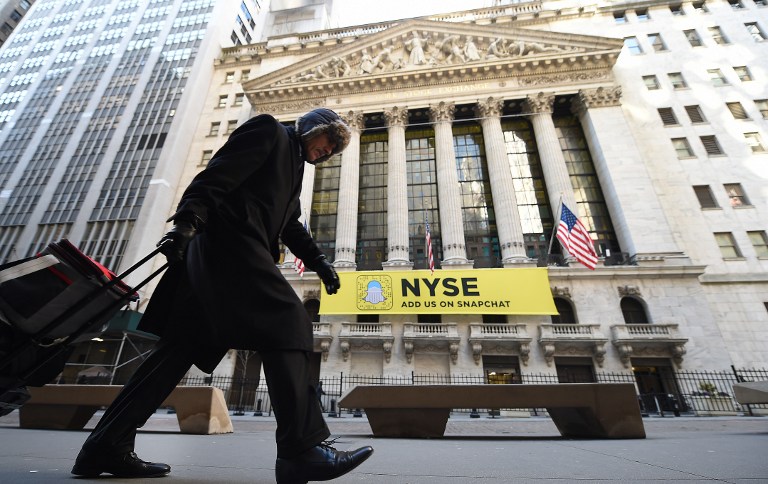
Wall Street stocks rose early on February 3, 2017 on a solid US jobs report as shares of large banks rallied on news the Trump administration will roll back financial regulations. The January US employment report included a better-than-expected 227,000 new jobs last month, keeping up the positive trends from the Obama years into the start of the term of President Donald Trump.Large banks such as JPMorgan Chase and Bank of America rose almost two percent as administration officials signaled that Trump will order a review of the Dodd-Frank law enacted after the 2008 financial crisis.
/ AFP PHOTO / TIMOTHY A. CLARY
by Andrew BEATTY
Agence France-Presse
WASHINGTON, United States (AFP) – President Donald Trump took the first step Friday to undoing key reforms enacted after the 2008 financial crisis, aiming to scale back toughened regulations on the banking industry.
The initiative aims to scrap parts of the so-called Dodd-Frank law, which backers say is aimed at curbing the actions of the finance sector that led to the “Great Recession,” but which critics claim creates red tape that stifles the industry.
“We expect to cut a lot out of Dodd-Frank,” Trump said at a White House meeting with business leaders.
“I have friends who can’t start businesses because the banks wouldn’t let them borrow because of rules and regulations and Dodd-Frank. So we’ll be talking about that in terms of the banking industry.”
Trump was set to sign two executive actions asking the Treasury and the Labor Department to study ways of reforming regulations that were designed to make markets safer and give consumers more protection.
One order will ask the Treasury Department to identify possible changes to the “Wall Street Reform and Consumer Protection Act” or Dodd-Frank signed into law in 2010 by president Barack Obama.
Among other things, the legislation created the consumer financial protection bureau and required banks to keep more capital on hand to prevent over-leveraging.
The review will also target the so-called “Volcker Rule,” which curbs some speculative investments.
“(We) believe that Dodd-Frank in many respects was a piece of massive government overreach,” said a senior administration official.
“It imposed hundreds of new regulations on financial institutions, it established an enormous amount of work and effort for financial firms.”
Republicans have made no secret of their dislike for the consumer financial protections bureau, which looks set to be targeted in the review.
Any substantial repeal of Dodd-Frank would require congressional action, but the Trump White House is keen to send a signal that it is ready to slash red tape.
Another executive order to be signed takes aim at the so-called fiduciary rule, which legally obliges financial advisors to act in their clients’ best interest.
Deferring implementation
The rule was scheduled to come into effect in April, but will be deferred, pending review.
“Americans are going to have better choices and better products because we’re not going to burden the banks with literally hundreds of billions of dollars of regulatory costs every year,” Trump advisor and head of the White House National Economic Council, Gary Cohn, told The Wall Street Journal.
“The banks are going to be able to price products more efficiently and more effectively to consumers,” said Cohn, a former Goldman Sachs executive.
John Berlau of the Competitive Enterprise Institute welcomed the moves, saying they would “greatly benefit middle-class investors, entrepreneurs, and consumers.”
In a blog post, Berlau said the fiduciary rule opens financial firms to arbitrary lawsuits and said Dodd-Frank “has been a huge burden on community banks, credit unions, and consumers.”
But Bartlett Naylor of the consumer activist group Public Citizen called Trump’s actions “a betrayal of his campaign promises” and a gift to big banks.
The undoing of the reforms “shows the Trump administration is on the wrong side. It’s on Wall Street’s side,” Bartlett added.
Trump is signing the measures on the same day he meets with business leaders that include JP Morgan Chase chief executive Jamie Dimon and BlackRock CEO Laurence Fink.
Market analyst Jasper Lawler at the London Capital Group believes that “unwinding some of Dodd-Frank is a good thing because it will enable smaller community banks to compete, offering competition to consumers.”
However, repealing too much of Dodd-Frank “puts the entire system at risk of a repeat of 2008,” the analyst said.
Sweden’s minister for financial stability Per Bolund, meanwhile, warned the moves could destabilize markets.
Bolund told Swedish news agency TT that these actions were “dangerous, harmful and extremely unfortunate,” and called for efforts to oppose the Trump actions.







